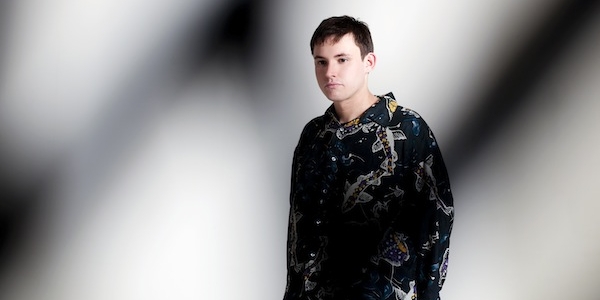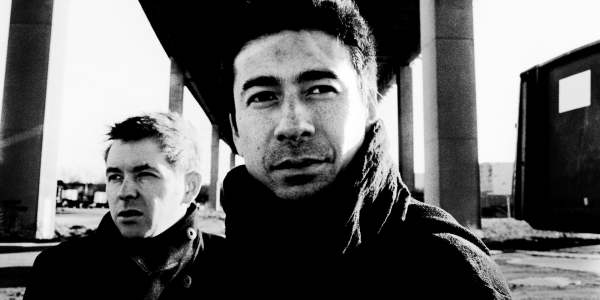Yet the more discerning music consumers may point you towards the new wave of beatmakers emerging from the rainy cities of Scotland – remarkably young, yet as talented as many of their peers, figures like post-dubstep’s Koreless or hip hop hero Rustie seem to be changing minds about the sleepy country. Possibly one of the most exciting being Glasgow’s Hudson Mohawke (the production alias of Ross Birchard), immediately demanding attention when signed to Warp Records at the startlingly youthful age of 23. One of the genius children of the hip hop/electronica offshoot rapidly gaining attention at the moment, it was on the strength of two self-released EPs that he was picked up by the revered label, allowing him the opportunity to show the world the potential of these two worlds.
It’s his first night back at home with the family when we get on the phone together, and we open up talking about life back home after an extended stay in London. “Traditionally, it’s been a techno city – there’s been a lot of influential house and techno records that came out of Glasgow – the very first ever Daft Punk record came out on a Glasgow label,” he points out. “And a lot of big bands have come from here. Within our circle of things though, it only really took off a couple of years ago. There’s quite a lot of people working on different stuff now. I hang out in London now, and Rustie lives there. Koreless still lives in Glasgow, and the Numbers guys still do their events there. There’s definitely enough of a scene there, even more so I think after we got ourselves a bit of attention and press, people have now started to move here thinking it’s a hotbed of good music, and there’s more club nights and events.”
Starting to DJ as a teenager, with an interest in production to be inspired not long afterwards (his first experiences were on a PlayStation game, due to a lack of PC and any recording equipment), he managed to make it to the finals of the DMC at 15. His experiences as a turntablist have shaped his earlier approaches to writing music, as he explains. “It makes you listen to music in a different way, which is good and bad. When I was really doing hardcore turntablism stuff, it’s very intricate and focused on the technical side of things. It’s good to apply that to production because it helps you to be very accurate and meticulous, detail-focused, but at the same time, I think you can get carried away with being too technical-minded. I had to learn to focus more on the musical aspect of it, and that’s why I stopped doing turntablism; I thought what I really wanted to do was make, listen to and DJ music that I enjoy listening to and not music that’s based off technical skills, so I consciously tried to make that move.”
I point out to him that his highbrow, technical approach is something that many listeners appreciate in his music, from 2009’s debut album Butter and the few EPs he’s put out, and he agrees. “It’s not something I’ll ever be able to completely get away from…but not necessarily as much as my old stuff – glitchy and cut-up. The recent material, I think, is more musical. It’s a little bit of a new direction; the last album I did was like a big collage of ideas, which is what I wanted to be at the time, like a mixture. Loads of random ideas and a big pastiche of different styles. This album, I’m trying to make it flow more like an album, have it less all over the place and more musical, more live instrumentation, but still like an electronic album.
Birchard’s music certainly shows off a highbrow technical approach, but there’s also a vivid liveliness to it, which he attributes to his early choices of listening material. “The first music I was really, really passionate about was rave music…even before turntablism and hip hop. I still listen to lots of it,” he reveals. “I don’t really keep up with the modern stuff, but I recently bought all the old vinyl I used to have – tracked down all of the original copies. Back in 1999 or 2000, my house got flooded and I lost all of it and last year, I decided I was going to re-collect all of it. It’s one of my main influences, really – still is today.”
Being signed by Warp was beyond a dream come true for Birchard, with their records forming a significant proportion of his listening material in his younger days. “I found it quite intimidating, really, I was worried by the prospect of having to release music on there because I’d spent so much time growing up listening to that music… it was just an untouchable, completely unreachable level. And their approach of not accepting demos, ‘We have to come to you if we want to sign you’, at that point, it was like, I can’t believe this is happening. All of the classic albums and the records, I thought there was a lot of expectations for me, but I got to the point of thinking these people who made these classic albums weren’t thinking, ‘Oh shit, I’ve got to make a classic album’ – they were just doing their own thing, and I felt that was the only way to really approach it.”
Keep doing your thing, HudMo.
BY MIKI MCLAY

